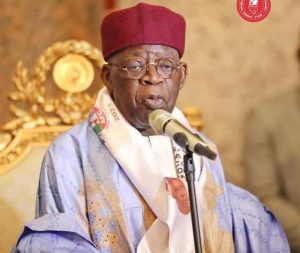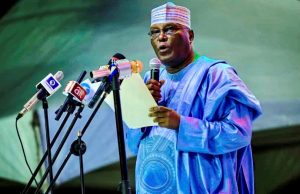By Amb Usman Sarki
I have nothing against competence but I am only suggesting that we should look at it more critically in order to place it at its right level of importance in determining the kind of leadership that we should seek for Nigeria. “Competence”, that opt-repeated nebulous word, has now come to the fore more than perhaps at any other time, as the defining ideal that should characterise leadership in Nigeria. No one has yet to my knowledge defined it properly in proportion of its significance to leadership. Suffice it to say that everyone is competent to the extent of their self estimation and the expanse of their fancy and boldness of their imaginations. Therein lies the problem with this term and its association with what leadership should or ought to be all about.

Peter Obi of the Labour Party
Given the chance and opportunity, every Nigerian can lead in certain situations and even become rather successful in the endeavour, no matter how trivial or inconsequential this might be. However, when it comes to the management of the affairs of a nation such as Nigeria, a much more important ideal would be required beyond ordinary “competence” for anyone to successfully govern the country and create the enabling conditions for attaining progress and cohesion. This short essay is about exploring these desiderata that go beyond ordinary competence. What should be noted is the distinction between diligence, which one writer cleverly termed as the ladder of the unintelligent, and competence, which is also not too distinct from the former, albeit a little more refined in its nuance and declivity. What is required is not a leader who shows competence in dealing with the affairs of the nation, but one who knows and understands what the nation is all about.
The problem with Nigerians is that they are too hasty in passing judgment on others while not pondering on their own capacities as well. They do not for example realise the importance of knowledge about things over and above ordinary competence. Knowledge presupposes both mental capacity and also aptitude for doing things or accomplishing tasks in specialised and regimented activities such as leadership be it in government, in the military or even in business. Without knowledge, there cannot be understanding. And without understanding, the ability to offer sound leadership is vitiated from the very start.

Asiwaju Bola Ahmed Tinubu of the APC
Rather than insisting on having a competent person at the helm of affairs in Nigeria, we insist on having a person who knows Nigeria better and appreciates her situation at any given moment. Such knowledge is important in offering the necessary vistas towards charting a course for the country to follow, and finding solutions to her myriad of problems. Without knowing the country’s complexities and challenges, it will be futile to bring competence into the equation of governance because that would become a truncated effort. One does not have to be competent to know his or her country but must use the relevant information and data to assess the situation in which the country is placed and what measures would need to be taken in order to create the right circumstances towards extricating the country from her difficulties.
Rather than look for competence, Nigerians should begin by looking for people who appreciate, understand and accurately or correctly judge how important it is to have a nation in the first place, whose affairs should be run better and efficiently with more than average means and methods. Such an exercise will necessarily translate into other requirements like experience, maturity in both age and temperament, sound judgment and abilities, and above all, the knowledge that is required to drive transformation and achieving of goals and targets in the administration of the country. Without these qualifications or attributes, leadership becomes a mere formula that is without of content no matter what competency is possessed by the persons in power.

Atiku Abubakar of the PDP
Indispensable and critical to the successful administration of a country is the sensitivity to the mood of the nation and the antennae for picking up the slightest vibration in the wide network of interests that crisscross each other in a complex web of interface across that constitutes the society or informs the government of a country. Competence alone does not offer this ability but knowledge does provide it and even makes it possible for the person who possesses it to make the required difference in the governance of his or her country. In our rather unique and idiosyncratic way of doing things especially going about our democracy, we should look more for educated people with the depth of vision and breadth of perspectives that are required to transform societies and take them to higher levels of material and cultural advancement through their informed leadership and guidance.
Competence may be allowed to play a role in relation to the practical administration of institutions that function in regulated manners and are guided by established codes, norms and traditions. Doing so will not require any spectacular attributes but application of one’s abilities no matter how limited they are to the tasks at hand. Leadership is an entirely different kettle of fish as they say, which should require in Nigeria’s case an above average competence and deeper knowledge about the environment in which we live. To successfully lead Nigeria, temperamental assessment of aspiring leaders should be the key to unlocking the secrets of the personalities that we are looking for.
Their knowledge and understanding of the country and her people will inform the direction that they intend to take Nigeria towards which must be critical in making such a giant leap of faith. Early administrators of the country did not look for ordinary competence but groomed and educated themselves and became knowledgeable about Nigeria which made them to govern the country successfully albeit under the most extreme of circumstances. I therefore wish to recommend the book “Nigeria: It’s Peoples and Problems” by Mr. E. D. Morel, published in 1911 as a beginning towards knowing our country.





























1 Comments
Khaled Maiwada Abdulsalam
I think this is the most difficult and complex assignment you have ever undertaken, Your Excellency.
Now ehat is competence?
Competence simply means
“the ability to do something successfully or efficiently”.
Therefore in the context of politics and successfully running a polity, it will take more than ordinary ability to discern the limit of and downplay the importance of competence as a sole attribute in leadeship especially in successfully running a complex country like Nigeria.
While competence cannot be just brush aside in successful leadership of Nigeria, yet many other leadeship attributes are sine quo non because of the relativity of the term “competence” which may work in one limited sphere such as Anambra state in the South East, but for differing socio-cultural and even economic reasons such “competence” may turn out to be incompetence in the North West, North East, South West or North Central because as Chinua Achebe rightly observed in one of his later days book that to achieve a goal by South Easterners, the fear of the higher power,religion and punishment in the hereafter for wrong doing, or the karma from the spirits does not deter him because to the South Easterner comes what may the end justifies the means…no check and balance (ie acquisition of money andcnaterial posssession by all means)
But the whole North and the South have their sense of covetousness effectively checked by the invisible higher power whether in forms of hell fire fir the Muslims and Northern Christian or Juju as the case of the Yoruba.
So here competence is just relative to a given socio-cultural group.
*FAM*